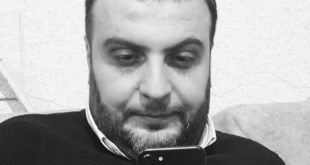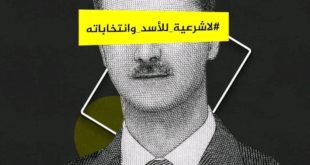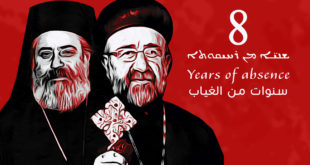By Inal Ersan and Marwan Makdesi
AL-HASSAKA, Syria (Reuters) – Sporadic gunfire echoed through the northeast Syrian town of Kemishli on Sunday as a burning grain silo and damaged public buildings showed the severity of two days of Kurdish rioting that killed 14 people.Senior security officials met local leaders as part of efforts to restore order, and a Reuters correspondent touring the town saw a badly damaged railway station, and schools and public offices that had been wrecked or burnt.
The violence in Kameshli, an ethnically mixed town near the Turkish and Iraqi border, ended after Interior Minister Ali Haj Hammoud flew to the area to take control and the authorities threatened those responsible with the “severest punishments”.
Police officers and residents armed with licensed hunting rifles patrolled the streets of al-Hassaka, the administrative centre of the region, where public and private buildings had been attacked and damaged. They said their orders were not to use force unless “absolutely necessary”.
Public offices in the al-Hassaka governorate, which has a population of 1.5 million with about 150,000 Kurds, were open for business, but parents were keeping children away from school, officials and residents said.
At least 14 people were killed and up to 40 badly injured during the riots on Friday and Saturday, which spread to several towns in the area and were triggered by a brawl and stampede at a soccer match in Kameshli.
The rubble-strewn streets of Kameshli were quiet on Sunday afternoon and citizens’ movements were severely restricted.
ACCUSED KURDISH POLITICIANS
Khaled Kheder, deputy governor of al-Hassaka, accused Kurdish political groups of instigating the rioting.
“The parties that instigated (the violence), which have internal and external affiliations, have deployed some poor Kurds to use them and exploit them…” he said.
Kurds also staged a protest in Damascus on Saturday in which public property and cars were damaged and police arrested several people, witnesses said. Police were posted near the capital’s Dummar suburb where several thousand Kurds live.
In a joint statement seen by Reuters in Beirut, Kurdish and human rights groups accused the Syrian state of “neglecting the rights of Kurdish citizens” and urged self-restraint.
It was not clear if the meeting, on Sunday evening, was held with the encouragement of the state officials who have been working to restore order in the city.
The newspaper al-Baath, organ of the ruling Arab Baath Socialist Party, said in an editorial on Sunday the unrest in the northeast was part of a plan “…to harm Syria and contribute to the sum of well-known pressures on Syria.”
The Bush administration has threatened to impose sanctions on Damascus to punish it for its foreign policies, including its refusal to close down Lebanese and Palestinian guerrilla groups which attack Israelis.
Sources close to government thinking said Kurdish politicians had tried to turn a soccer match riot into a political issue, a reference to the grievances of some 200,000 Kurds not recognised as citizens.
One of the sources said the government was close to announcing a solution to the problem of stateless Kurds, but propaganda by banned Kurdish groups had held things up.
There are about two million Kurds in Syria’s 17 million population, but Syrian officials avoid reference to Kurds as a distinct minority and stress the importance of national unity. Kurds and other minorities have held senior government and army positions.
Check Also
The ADO calls for the disclosure of where about of Archbishops Youhanna Ibrahim and Paul Yazji, abducted eight years ago.
22-04-2021 On the twenty-second of April of 2013, the two Bishops on their way back …
Kurds riot in Syria
Senior security officials met local leaders as part of efforts to restore order, and a Reuters correspondent touring the town saw a badly damaged railway station, and schools and public offices that had been wrecked or burnt.
The violence in Kameshli, an ethnically mixed town near the Turkish and Iraqi border, ended after Interior Minister Ali Haj Hammoud flew to the area to take control and the authorities threatened those responsible with the “severest punishments”.
Police officers and residents armed with licensed hunting rifles patrolled the streets of al-Hassaka, the administrative centre of the region, where public and private buildings had been attacked and damaged. They said their orders were not to use force unless “absolutely necessary”.
Public offices in the al-Hassaka governorate, which has a population of 1.5 million with about 150,000 Kurds, were open for business, but parents were keeping children away from school, officials and residents said.
At least 14 people were killed and up to 40 badly injured during the riots on Friday and Saturday, which spread to several towns in the area and were triggered by a brawl and stampede at a soccer match in Kameshli.
The rubble-strewn streets of Kameshli were quiet on Sunday afternoon and citizens’ movements were severely restricted.
ACCUSED KURDISH POLITICIANS
Khaled Kheder, deputy governor of al-Hassaka, accused Kurdish political groups of instigating the rioting.
“The parties that instigated (the violence), which have internal and external affiliations, have deployed some poor Kurds to use them and exploit them…” he said.
Kurds also staged a protest in Damascus on Saturday in which public property and cars were damaged and police arrested several people, witnesses said. Police were posted near the capital’s Dummar suburb where several thousand Kurds live.
In a joint statement seen by Reuters in Beirut, Kurdish and human rights groups accused the Syrian state of “neglecting the rights of Kurdish citizens” and urged self-restraint.
A Kameshli resident told Reuters the Assyrian Orthodox Church for the Euphrates had held a meeting with Kurdish and other tribal leaders to seek an end to the violence and “emphasise the importance of national unity”.
It was not clear if the meeting, on Sunday evening, was held with the encouragement of the state officials who have been working to restore order in the city.
The newspaper al-Baath, organ of the ruling Arab Baath Socialist Party, said in an editorial on Sunday the unrest in the northeast was part of a plan “…to harm Syria and contribute to the sum of well-known pressures on Syria.”
The Bush administration has threatened to impose sanctions on Damascus to punish it for its foreign policies, including its refusal to close down Lebanese and Palestinian guerrilla groups which attack Israelis.
Sources close to government thinking said Kurdish politicians had tried to turn a soccer match riot into a political issue, a reference to the grievances of some 200,000 Kurds not recognised as citizens.
One of the sources said the government was close to announcing a solution to the problem of stateless Kurds, but propaganda by banned Kurdish groups had held things up.
There are about two million Kurds in Syria’s 17 million population, but Syrian officials avoid reference to Kurds as a distinct minority and stress the importance of national unity. Kurds and other minorities have held senior government and army positions.
Check Also
The Assyrian Democratic Organization condemns the Syrian regime’s attacks on Daraa Governorate
31-07-2021 At a time when the country is experiencing an unprecedented crisis economic, services, and …
 Assyrian Democratic Organization ADO
Assyrian Democratic Organization ADO









